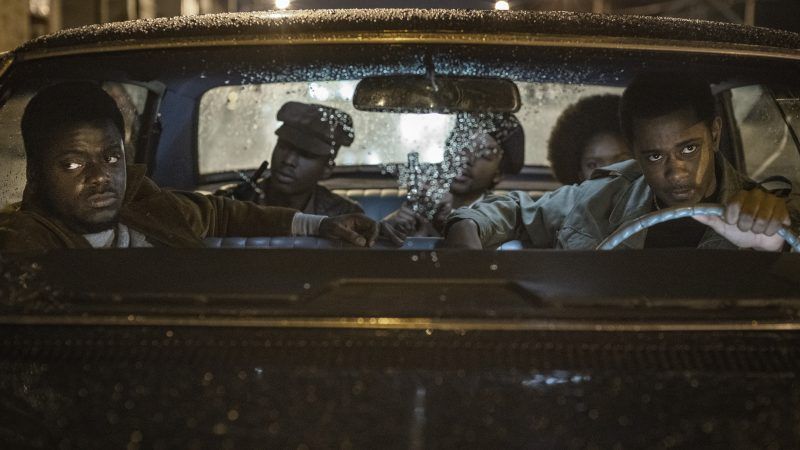Review: Judas and the Black Messiah
Daniel Kaluuya and LaKeith Stanfield revisit the horror of a civil rights battlefield of the 1960s.

Judas and the Black Messiah comes at you like a shotgun blast full in the face. In his first major feature, director Shaka King supercharges the story of murdered '60s Black Panther leader Fred Hampton (Daniel Kaluuya in an electrifying performance) and his betrayer, turncoat Panther Bill O'Neal (LaKeith Stanfield, likewise superb). The movie deftly illuminates a central ideological issue of the period—nonviolent community uplift versus extremely violent Maoist revolution—but it also delivers explosive action scenes when the Panthers fight back against their lawless FBI antagonists, and a brilliant avant-funky score (by Mark Isham and Craig Harris) that's expertly ornamented with vintage contributions from Gil Scott-Heron, Eddie Gale, and Rahsaan Roland Kirk, among many others.
The story begins in Chicago, in 1967. Smalltime criminal O'Neal has been popped by the Feds for car theft and for waving around an FBI badge that wasn't his to wave. "A badge is scarier than a gun," he explains to his interrogator, a bureau agent named Roy Mitchell (Jesse Plemons, wonderfully ambiguous). Mitchell tells O'Neal he can either do prison time for his felony transgression…or he can go home right now if he agrees to become an FBI informer. O'Neal, a man whose ideals are entirely negotiable, takes the bait immediately.
Before long, O'Neal has insinuated his way into the Illinois chapter of the Black Panther Party, where he becomes the chapter security chief and the bodyguard of its leader, Fred Hampton. Director King lets Hampton—a onetime pre-law student who's moved on from an earlier political home in the NAACP—press his revolutionary case from beyond the grave, holding on closeups of a fiery Kaluuya as he rouses crowds with his effortless charisma. "War is politics with bloodshed," he tells people. "Politics is war without bloodshed." Naturally, in the spirit of the times, he also name-checks Mao Zedong from time to time— "Political power flows out of the barrel of a gun," all that stuff. But the Hampton we see here is most committed to providing healthcare for the poor and free breakfasts for hundreds of hungry kids every day. He's also getting his harder edges sanded down by a sweet-but-tough Panther newbie named Deborah Johnson (an irresistible performance by Dominique Fishback, of The Deuce).
The FBI has a different view of Fred Hampton—to them he's a dangerous radical, much like the feminists, hippies, and plain old Communists of whom they also disapprove. Empowered by a secret, illegal dispensation called COINTELPRO, the bureau has partnered with police organizations to harass and destabilize bad-mannered political groups around the country. These troublemakers can always be jailed, of course, but as we hear FBI chief J. Edgar Hoover (Martin Sheen) say at one point, "Prison is a temporary solution."
Meanwhile, Agent Mitchell is telling Bill O'Neal that the Panthers and the Ku Klux Klan are basically the same—and pressuring him to provide a blueprint of Black Panther headquarters. This he does, and the building soon goes up in flames after a furious assault by the FBI and Chicago police.
Stanfield has a tricky challenge here. O'Neal is a sympathetic character (to an extent) simply because this particular actor is playing him. But he is also detestably treacherous; and while we may occasionally detect faint glimmers of conscience or regret moving across his face, they never translate into redemption—betrayal is the sewer through which he will always swim. (The real O'Neal died in 1990.) So when Agent Mitchell orders him to draw another blueprint—this one for Fred Hampton's home—O'Neal clearly realizes he's about to cross a final moral frontier. Somewhere in the dark basement of his soul, he may feel guilty about this—but he does it anyway, and as the movie nears its end, director King brings all of his artistic power to bear on recreating a state-executed slaughter that's still horrific.
Heavily flawed first-generation Panthers like Huey Newton and Eldridge Cleaver used to get all the ink, but Hampton may be more worthy of reinspection. He was 21 years old when he was shot dead in his Chicago bedroom in 1969; now, 50 years later, this movie brings him back. "You can murder a revolutionary," he once said, "but you can't murder a revolution." He's still right about that.
(Judas and the Black Messiah is airing now on HBO Max.)

Show Comments (27)